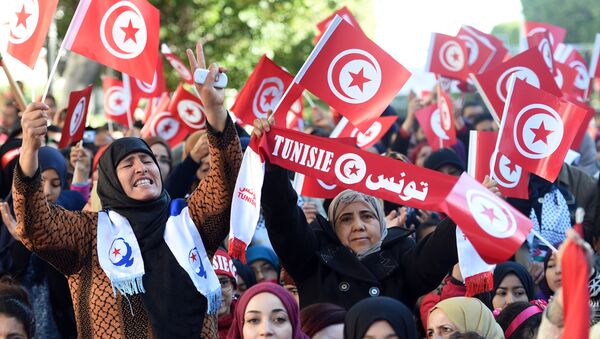A new report published by Amnesty International (AI) has alleged that "brutal repression" is on the rise again in Tunisia, with reports of people being tortured and forced to sign false confessions under duress.
Today marks 5 year since mass protests ousted Tunisia's Ben Ali. A human rights overview: https://t.co/zfYbnqTK7Z
— Amnesty UK (@AmnestyUK) January 14, 2016
According to testimonies collected by AI, some detainees have been subjected to electric shocks, including on the genitals, while others said they had been held in a stress position called the "roast chicken" which consists of being forcefully curled up in a ball with the victims' hands and feet cuffed to a stick.
Other forms of abuse allegedly carried out by interrogators included people being slapped, forced to undress, while others signed false confessions after having serious threats made against their families.
Deaths in Custody 'Have Not Been Investigated'
AI also raised concerns over six deaths in custody since 2011 that "have not been effectively investigated or where investigations have not resulted in criminal prosecutions," and called for a thorough, independent investigation into the incidents.
New evidence of torture five years on from Tunisia's 'Jasmine Revolution' https://t.co/mjhH0ySrVC pic.twitter.com/mZa2hGiKVJ
— AmnestyUK Media Team (@NewsFromAmnesty) January 14, 2016
Questions remain over the death of Sofiene Dridi, who was extradited from Switzerland in September last year due to a violent assault charge.
After appearing in court in good health on September 15, Dridi was transferred to Mornaguia prison. Just three days later his family were informed that he had died of a cardiac arrest, however when they went to view his body, they reported to AI seeing bruises all over his face and torso. They family are still awaiting a final report into the cause of death.
The report comes five years after former leader Zine Abidine Ben Ali was overthrown in the 'Jasmine Revolution' of January 2014, which many credit as being the trigger for the Arab Spring protests across the region.
Concern Over Anti-Terror Laws
While Tunisia has been badly affected by Islamist terrorism in recent times, the government has been accused of taking a heavy-handed approach to security.
New counterterror laws adopted by the Tunisian parliament last July expanded the definition of terrorism in vague, broad terms, ultimately giving security forces more surveillance and monitoring powers to arrest anyone suspected of terror offences.
The AI report contained testimonies from the family of some terror suspects, who said they have faced continued harassment from security forces, with one man telling AI that "security agents break down the doors to his family home almost every night."
Amnesty Tunisia: Sweeping crackdown signals abuse of emergency measures https://t.co/cBq0UrHK96
— Said Boumedouha (@SBoumedouha) December 2, 2015
The report also contained allegations that some people were questioned about their religious beliefs based on their beards, as part of a worrying trend aimed at cracking down on free speech and political opposition in the country.
"Laws arbitrarily restricting freedom of expression remain in force in Tunisia and critics — particularly critics of the security forces — are prosecuted on charges of defamation and 'indecency,' " the report noted.
Tunisia Risks Going Back to The Darkness of the Past
Amnesty International Middle East and North Africa Deputy Director Said Boumedouha said there are concerns the current Tunisian government is following the path of its widely condemned predecessors.
"Five years ago Tunisians rose up and threw off the shackles of authoritarianism. Torture and repression were hallmarks of former President Ben-Ali's regime; they must not be allowed to become defining features of post-uprising Tunisia.
"While it is understandable that security is a priority for the government in light of the bloody attacks that have shaken Tunisia in the past 12 months, it cannot be used as a pretext for a U-turn on the modest human rights progress achieved since the uprising. There is a real risk that this ill-conceived backlash will lead Tunisia back to the dark point it was at five years ago," said Boumedouha.





